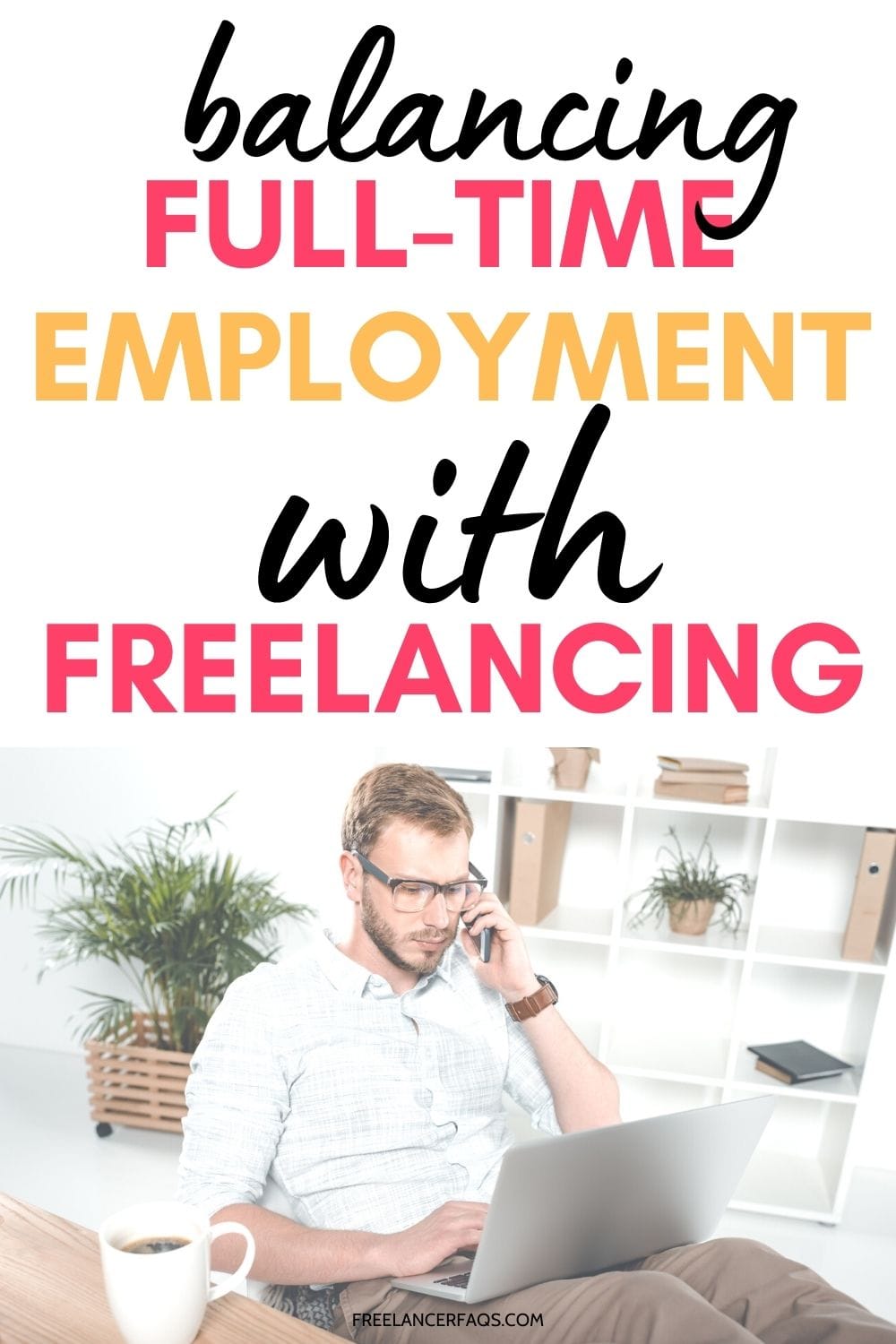When it comes to freelancing, there are many benefits.
Typically, freelancing allows you to set your own schedule and be your own boss.

The flexibility and the ability to make your own business decisions are a huge draw for many freelancers.
That said, getting started in a freelance career isn’t always easy, and many freelancers need to learn to walk the fine line of balancing a full-time employment with a side hustle as a freelancer before being able to go all in.
If you’re walking this fine line, you need to understand how to stay focused enough to be successful on both sides. If you let your full-time employment hours burn you out, you’ll never succeed as a freelancer.
And, if you focus too fully on your freelance career, before it becomes your full-time gig that is, you can risk losing your full-time job.
To help you stay on track on both sides as you work toward your goal of becoming a full-time freelancer, dig through this guide to help you stay on track and be amazing on both fronts.
Let’s start by taking a look at the benefits of each side, starting with full-time employment.
What are the Benefits of Full-Time Employment?

While your main goal is to get your freelance business rolling and become your own boss, there are a number of benefits to maintaining full-time employment hours.
1. Stability
The most important thing to consider when you make the move to freelancing is to ensure you have stability while you get your business up and running.
In other words, don’t quite your day job until your freelance business is rolling along and capable of sustaining your lifestyle on its own.
With full-time work, you’ll continue to receive a steady paycheck you can rely on while you work toward building your freelance work into a freelance empire.
2. Company Benefits
One of the great benefits of full-time employment employment is that if you’re with a fairly established business, you’ll most likely be eligible for company benefits.
Companies want to stay competitive in the market, so they will look to put together a benefits package that keeps your life secure and helps you prep for retirement and other life changes.
3. Healthcare
Healthcare is a hot topic in today’s world, and full-time employment hours often allows you to have access to a healthcare package to cover your medical expenses, as well as those of your family.
Companies often use a healthcare package as a way to attract top talent – such as yourself.
As a freelancer, you’ll need to set aside some of your revenue to dedicate to purchasing healthcare on your own. It can be tricky to navigate the packages available to you, but there are plenty of websites available to help.
4. Making Friends And Connections
Another benefit of full-time employment, is that you’ll most likely make some good friends and connections. They say the people you work with can end up being your closest friends.
These connections could help you move up the career ladder or give you insights within your industry that you may not have achieved from one off or digital conversations while freelancing.
When you do make the transition to freelance, make sure to maintain ties with any friends you make during your full-time years.
What Are the Benefits of Freelancing?

Full-time work certainly has its positive talking points, but ultimately, who wouldn’t love the freedom of being your own boss and waking up to being awesome, in whatever way you choose – every day?
Let’s take a look at the benefits of freelancing.
1. Be Your Own Boss
When you’re freelancing, you can set your own schedule.
You don’t have someone looking over your shoulder ordering you around, and you can decide which clients and projects you want to take on -and which ones you don’t.
2. Making Friends and Connections
Wait…wasn’t this a full-time employment benefit?
It turns out you can make tons of friends as a freelancer as well.
They just might be friends you make online through collaboration and working together on digital projects instead of in person.
It’s amazing the connections you can make across the world when you work in the digital space.
3. Enjoy More Family Time
As you’re now able to set your own schedule as a freelancer, that means you can carve out family time more regularly.
You can take vacations whenever you want.
With a full-time job you might have 3 weeks of vacation time each year, but with a freelance job, as long as the work is rolling in, you can take as much vacation time as you need (and as your revenue stream permits).
4. Gain a Variety of Experience
Often, a full-time job requires you to focus on a ton of the same tasks, utilizing the same methods – over, and over, and over.
With freelancing, you can be a bit riskier and try out new things.
Test out new tactics, learn new skills and really grow your business in the direction you want, in a variety of ways.
How Do You Walk the Line Balancing Freelance with Full-Time Employment?

Ok, so we’ve looked at both sides, and there are clear benefits on each.
Your career trajectory, however, has been pre-determined, and your ultimate goal is to end up as a freelancer running your own freelance business.
So, how do you get there?
How do you balance working full-time employment and freelancing until you’re able to cut the ties to full-time hours and go freelance for good?
Let’s dig into a few keys tips you can follow to successfully walk the line.
1. Separate the Who Worlds
The biggest mistake you can make in balancing a full-time employment job with your freelancing work is overlapping your hours.
You need to set boundaries.
If your employer requires you to work 9-5 each day, don’t try to sneak in an hour of freelancing midday between meetings.
If you overlap the two, you will find yourself doing lower quality work on each side just to make it work.
And don’t pass on lunch and do your freelance work during your lunch break either.
During an 8-hour day, you really need that break to unwind and refresh before racing down the home stretch to the finish line.
Instead, focus on your full-time job during the hours your employer requires.
Then carve out time either before or after work to focus on your freelance business. Make sure your family is on board and set specific days/times to do your freelancing.
2. Limit Your Clientele…at First
 Your focus should be on only taking on the number of freelance clients you can handle while still being able to produce 100% high-quality work for both your full-time role and your freelance role. If that means you can only handle 1-2 clients at a time, so be it.
Your focus should be on only taking on the number of freelance clients you can handle while still being able to produce 100% high-quality work for both your full-time role and your freelance role. If that means you can only handle 1-2 clients at a time, so be it.
The benefit of doing this is that you will build you portfolio of happy clients, as you won’t be taking on too much. Take on 1-2 projects at a time.
Over the course of the year, you’ll notice that taking that time to really focus on pleasing your clients has allowed you to build a portfolio of 10+ happy clients, all of whom are great sources for referrals once you go fully freelance.
Taking on too many freelance clients will cause your work to suffer on both sides of the line.
If your work suffers on the full-time side, you could lose your job, and with it goes your secure, consistent income stream.
On the other side, you could end up producing mediocre work for your freelance clients.
And while they will still likely pay you, they won’t become recurring clients, and they’ll certainly never vouch for you or refer more clients to you.
3. Focus Your Finances
Another area that’s critical to your freelance success is the need to split your finances.
You should be doing your freelance business finances separately from your other finances that come from your full-time employment. This is important for several reasons.
- You can track your freelance business results to determine when things are coming to a financially stable point that you can consider taking that next step.
- When tax time comes around, your life will be a lot less stressful because you’ll have all your freelance finances clearly defined and ready for doing your taxes.
- You won’t spend money that you’ll later need to put back into your freelance business in the form of investments in technology, promotion and other expenses.
Keeping your full-time finances separate from your freelancing finances is super important. Don’t ignore this step or you can end up with a financial mess.
4. Take Time to Market Your Freelance Business
If you hide your freelance business in the background while you balance it with your full-time job, it will take so much longer to get it going.
Neglecting to promote your business can cause you to significantly increase the amount of time it takes for you to fully transition into being your own boss.
So, make sure you take steps to promote your business early on.
Set up a website with a blog to get your name out there and promote your knowledge.
Have social media channels in place for building your freelance brand and networking with other freelancers to build collaborative relationships that can help you down the road.
If you wait to launch your digital presence for your freelance business until after you go fully freelance, it will take forever to get your brand out there and put yourself on the map as a trusted resource.
By getting all these things in place ahead of time, you can build SEO value on your site, make your brand recognizable, build up reviews in places like Google My Business, and grow a network of collaborators who can work to grow together.
Wrapping It Up
I can’t stress this enough.
Moving from a full-time employment hours to going full-time as a freelancer is not easy. That said, freelancing can be extremely rewarding if you do it the right way and take your time.
Make sure you are busily building a presence for your freelance business so you can launch fully into the space once you’re ready.
And be sure you only launch fully into the freelance world when your finances are in order and you are confident you have the clientele and funding to keep your new venture going.
Once you’re ready, dive into the world of freelancing full force and carve out your niche. Be your own boss and start living life the way you want to live it.
Happy freelancing!



Leave a Reply